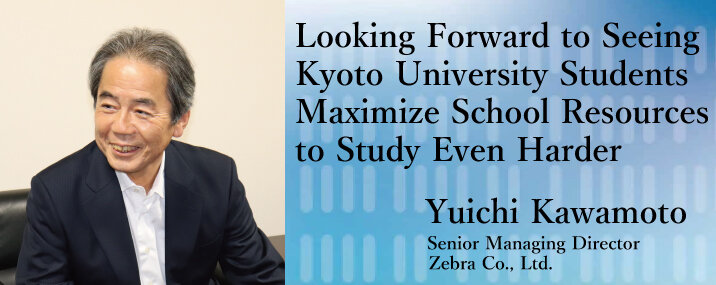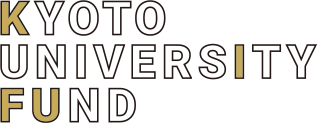Vol.17 Interview with Donors

Yuichi Kawamoto
Born in Fukuoka Prefecture in 1955. Graduated from Kyoto University's Faculty of Law and joined the Industrial Bank of Japan in 1978. Served as Deputy Department Manager of the Business Department. Subsequently, after the Industrial Bank of Japan's merger that formed Mizuho Bank, served as Executive Officer and Department Manager of the Market and Finance Department. Joined Zebra in 2008. Assumed his current position in 2012.
Q Would you care to share with us your college memories?
I moved around a lot as a child due to my father's job. We first lived in Tokyo, then moved to Nagoya during my junior high school years, and then to Osaka while I was in high school. So, I did not entirely grow up as a Kansai person. Yet, I chose Kyoto University for two reasons: I wanted to attend college at the former Third High School and it was in Kyoto.
My interest in the former Third High School developed during junior high school, triggered by a number of novels by Torahiko Tamiya, known as the Sanko (Third High School) series. By 1974--the year I entered--25 years had already passed since the former Third High School was renewed. However, many Third-High-School instructors still taught at the University, so I was able to sense what the school must have been like.
Wanting to attend college in Kyoto seemed also one of the reasons many of my classmates entered the University, and just as they seemed to be, I was also delighted at the realization that my life was now based in Kyoto City. Mt. Daimonji, known for the Gozan no Okuribi (Five Mountains Bonfire) festival, and the Kamo River were part of my memorable four-year college life. On a different note, after graduating and entering the business world, the first office I was assigned to was in Kyoto, and based on my experience of working there for a year, my impression of Kyoto as a market is that the city is extremely competitive.
Back in my days in college, the effects of the student movements that took place some years earlier could still be felt. Examinations would be cancelled, and seminars would be taught off campus. Under these circumstances, I found it hard to set a goal that I could devote myself to achieving. I did study but not very hard and fooled around rather often, spending my days at the University half-heartedly. After all these years since graduating, I still regret not paying attention during its liberal arts classes. Recalling that they were taught by renowned scholars, I have no doubt that the classes would have helped me immeasurably had I taken them seriously.
Another thing I did not take very seriously was my job search. All I cared about was finding a job at a company with its roots in the Kansai region. So, I simply planned to join one that my seminar instructor introduced me to. However, I lost my direction when the company subsequently announced it would not be recruiting any new workers that year. I would eventually find a job at a bank, but I only did so as a result of following the example of one of my close fellow seminar members.
Q Would you care to share with us any differences you noticed between
universities in Tokyo and Kyoto University while working in Tokyo?
As I said earlier, I had gone job-hunting without practically any knowledge of individual industries or companies, including the bank that hired me, and frankly, Kyoto University students have always struck me as naive as I was. On the other hand, students at universities in Tokyo have always impressed me as having done their homework on industries very thoroughly. Years later, after I switched roles from interviewee to interviewer, my impression of Kyoto University students as naive came to be confirmed. Because Kyoto University students come unprepared, their answers to our questions do sound original, but for the very same reason, they also strike us as odd.
After leaving Kyoto, I mostly worked in Tokyo and noticed many features shared by universities in Tokyo. University instructors in Tokyo have more opportunities to interact with people outside the academic world because they are the ones usually invited to government councils. Accordingly, their students receive the social influence they gained outside.
On the other hand, we hardly hear anything about Kyoto University in Tokyo. While working in Tokyo, I personally thought that being located far away from the central government allowed Kyoto University to exist in some unique dimension free from the influence of other sectors, and that helped it come up with unique ideas, which I believe is its strength. However, at the same time, I thought it should make more industry-academia collaborative efforts with companies in Tokyo if it wants to increase its presence.
Q What kind of efforts do you look forward to seeing Kyoto University
make in this 125th anniversary year and after, and is there a message
you want to leave Kyoto University students with?
The novel coronavirus pandemic drew attention to the Kansai region. The Governor of Osaka's quick strategic response particularly attracted nationwide attention. Japan's national resources are too concentrated in Tokyo to the degree that crises like COVID-19 could become fatal to the nation. Universities in the Kansai region need to help their country by performing think-tank functions, and I look forward to seeing Kyoto University serve as a model in this respect.
In my days, graduating from college did not require much academic effort and neither did working afterwards. Companies provided us with in-house training and expected to find us useless at least throughout our initial year.
However, over the recent years, the need to generate profits in shorter periods of time has become increasingly critical, and investing in in-house training is currently practically impossible. Companies have become less adept at training new employees and more inclined to look for a ready-made workforce. Accordingly, their expectations for new employees have risen. In fact, I, as others do, often ask new employees what knowledge and skills they acquired in college.
What companies need today are people who know how to apply what they learned, and I believe Kyoto University provides students with one of the best environments to grow into such people. The University's tradition of granting academic freedom, its excellent facilities, and its diversity of talent comprise a foundation for students to expand their knowledge and practice flexible thinking. Because of my own regrets, I would like Kyoto University students to put effort into keeping themselves updated on resources available at their University, remember that social expectations for them are high, and study the hardest they can.
(Interviewed in May 2020)


